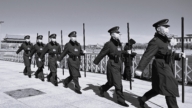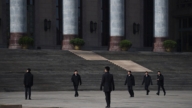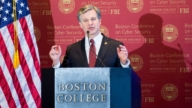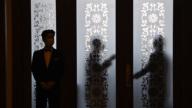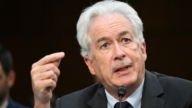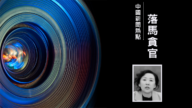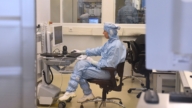【新唐人2014年10月21日讯】在中共的假普选受到港人排斥以来,中共各路媒体一直宣传英国不曾给港人民主。不过历史资料显示,当年香港属于英国的殖民地时,英国几度尝试让香港民主化,却遭到中共阻止,甚至扬言要全面入侵来阻止英国这一举动。
香港当前的和平占中民主运动,不断遭到中共喉舌媒体攻击,甚至造谣说,英国统治香港的155年,从来没有给过香港民主,英国面对香港的民主运动坚决镇压。
不过,事实上,英国殖民地在英国引导下全部实现了民主,不只是有美国、加拿大、澳大利亚等成功范例,包括马来西亚、新加坡以及巴基斯坦、印度等也都实现了民主自治。
英国外交部档案显示,1958年1月30号,中共总理周恩来会见英国代表团时,向英国首相麦克米伦传话说:“中国会将任何推动香港自治的行为,视为非常不友好的举动。中国希望香港的殖民地地位,不会有丝毫的改变。”
1960年10月29号,当时出任“华侨事务委员会”主任的廖承志,与香港工会代表访京团聚会时,警告英方:如果英国要在香港搞民主,就会毫不犹豫解放香港。
《中国事务》总编伍凡:“ 英国人撤出远东的时候,它把民主制度留下来了,人家是有计划要把这些殖民地建成一个民主社会,香港那个时候英国人说要建立民主制度,中共说NO,不可以,那是我的地盘,我以后来做,怕影响中国大陆的专制制度嘛。”
《美国之音》评论说,中共当局最担心的是,香港人一旦享有民主权利,便会成为一个自治的地区,进而脱离英国独立。而当时的香港居民中,有大批在内战、土改时期逃离大陆的难民,和三年大饥荒时期冒死逃到香港的中国人,他们如果手中有选票,绝对不会选择回归到共产党统治下的中国。
当时廖承志曾表示,中方从不承认港九新界是英国领土,但因为英国继续管治香港,对中方有利,所以才不要求收回。
伍凡:“ 为什么大陆不要呢,因为当时中共完全给包围了,它唯一的出口就是香港,如果把香港收回去,它就没有出口了,所以它做各种各样的走私,买卖都通过香港。”
到了八十年代,中英条约即将到期届满,香港回归中国成为一个现实的议题,当时香港人心开始恐慌,将回归称之为“九七大限”。
1982年9月,英国首相撒切尔夫人访华。她提出中国可以收回主权,而英国人依然保留管理香港的权力。邓小平拒绝后说,未来香港要实行的是“高度自治,港人治港”。
1984年12月,中英签署了《中英联合声明》,阐明了“一国两制,港人治港”的原则,保证香港的资本主义制度五十年不变。1990年4月,中共人大颁布《香港基本法》。
而在香港这方面,英国人也在加紧推动香港的民主化。1992年,彭定康接任港督,很快就推出了政治改革方案,准备在回归之前更多地扩大直选范围,增加港人的民主权利。
美国海军学院的历史学教授余茂春:“民主是究竟是为了什么,在英国统治之下,香港是没有民主的,但是它有自由,有人权,有法制,现在中共它基本上不讲两制了,什么都要按照中国大陆那个权利来,民主的问题实际上就变得非常的突出。香港老百姓对中共失去了信心,一国两制,回归祖国,都没有太大意义了。”
当时对于彭定康见缝插针地引入多项民主改革措施的政改,让中共大为恼火。时任港澳办主任的鲁平,甚至大骂彭定康为中共的“千古罪人”。
采访编辑/刘惠 后制/葛雷
Why Did CCP Stop Britain’s Push for Hong Kong Democracy?
Since the fake universal suffrage in Hong Kong was rejected,
the Chinese Communist Party’s (CCP) mouthpiece media
claimed that Britain never granted democracy to Hong Kong.
Historical data shows however, that the CCP had blocked
Hong Kong’s democratization by the British several times,
and even threatened to invade in full-scale to stop Britain
pushing forward with realizing democracy in Hong Kong.
The Occupy Central has been constantly attacked
by the CCP regime’s media.
There are even rumors that in the 155 years of British rule,
Hong Kong had never been free, and that the democracy
movement had been resolutely repressed by Britain.
Yet, all of Britain’s colonies have achieved full democracy
under the country’s rule, such as the United States, Canada,
Australia, Malaysia, Singapore, Pakistan, and India.
Declassified archives show the message relayed to the British
Prime Minister Harold Macmillan by the British delegation
conversation with premier Zhou Enlai on Jan. 30, 1958,
in which Zhou said, “China would regard any move towards
Dominion status as a very unfriendly act."
“China wishes the present colonial status of Hong Kong
to continue with no change whatever."
In 1960, Liao Chengzhi, China’s director of overseas Chinese
affairs told Hong Kong union representatives that China’s
leaders would “not hesitate to take positive action to have
Hong Kong, Kowloon and the New Territories liberated,"
if the British allowed self-governance.
China Affairs editor in chief, Chris Wu: “Britain left the system
of democracy in the colonies when they withdrew from
the Far East."
“The CCP said no to the democratization of Hong Kong
for fear of jeopardizing the autocracy of the mainland."
Voice of America commented that, what worried
the communist regime the most was that the democratic
rights of people will turn Hong Kong into an autonomous
region that’s independent from Britain.
Among the Hong Kongers, many of them were refugees
from the civil war, land reform period and the three-year Great
Famine; should they be entitled with votes, they will never
choose to return to the communist regime.
Liao Chengzhi had also said at the time that the CCP “never
recognized Hong Kong, Kowloon and the New Territories
as British territory, but the present status of Hong Kong
is to our benefit."
Chris Wu: “The CCP did not want Hong Kong, because it was
completely surrounded; Hong Kong was its only outlet."
“The returning of Hong Kong at that time meant the loss of
outlet for smuggling and trading through Hong Kong."
In the 1980s when the Treaty of Nanking was about to expire,
the return of Hong Kong became a reality issue.
The panicking Hong Kongers called it “the 97 deadline".
In September of 1982, Prime Minister Margaret Thatcher
visited China and proposed to return its sovereignty,
while the Brits remained the ruling power in Hong Kong.
But Deng Xiaoping rejected and claimed that Hong Kong
will become highly autonomous and self-ruling.
In December 1984, the Joint Declaration clarified the
“one country, two systems" principle to ensure Hong Kong’s
capitalist system for 50 years.
In April 1990, the CCP National People’s Congress
promulgated “Hong Kong’s Basic Law."
Britain also stepped up democratization in Hong Kong in 1992
with Governor Chris Patten quickly launching political reform
with hopes to expand the scope of elections and democratic
rights in Hong Kong before the reunification.
Yu Maochun, Prof. of Modern China and Military History,
US Naval Academy: “What is democracy? Under British rule,
Hong Kong had no democracy, but it did have freedom,
human rights, and rule of law."
“When the CCP disregarded the two systems and everything
had to follow the mainland, democracy became prominent."
“The Hong Kong people have lost confidence in the CCP;
the so-called ‘one country, two systems’ and the ‘return to
the motherland’, don’t make much sense now."
As for the democratic reform measures introduced by Patten,
the CCP was furious.
Lu Ping, then Director of the Hong Kong and Macau Affairs
Office of the State Council said that “Patten is a ‘sinner'"
Interview & edit/LiuHui post-production/GeLei


